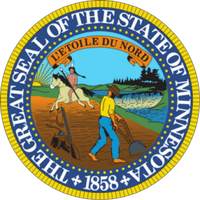As Minnesota’s agricultural industry continues to recover from severe drought conditions across the state, Governor Tim Walz has signed Executive Order 21-33, extending an emergency and waiving trucking regulations to support Minnesota livestock producers in the safe and efficient transport of commodities related to livestock feed.
The extreme and prolonged drought in Minnesota has led to significant stress on rangeland, pastures, and other crops. Without reliable access to good-quality hay or forage, famers and livestock producers have had to adjust their feeding operations to include other commodities such as corn silage, distiller grain, and beet pulp. Farmers also report that the hay and forage reserved for winter use has already been consumed, and replenishing supplies is critical to maintaining healthy livestock. The continued movement of these commodities is vital to the economic security and viability of many farming and livestock operations in Minnesota.
“When I travelled across the state this summer I heard directly from our farmers and saw firsthand the impacts of a drought that caused early harvests, wildfires, dry fields, and pastures,” said Governor Walz. “The seasons may be changing but the effects of this drought aren’t over, and our farmers still need our help. I am committed to working in partnership with Minnesota’s agricultural industry to provide relief for the farmers who have continued feeding our state and nation through this historic drought.”
Since July, Governor Walz has issued executive orders relaxing certain hours and service restrictions for drivers and vehicles transporting critical supplies such as livestock, hay, forage, water supplies, and supplemental feed commodities. Last month, Governor Walz issued Executive Order 21-32, extending this relief until November 3, 2021. Although conditions have improved enough that there is no longer a need to exempt transportation of livestock and water supplies from hours of service requirements, farmers and livestock producers still need to travel across the state to find available feed.
Over the past few months, Governor Walz has met with agricultural leaders from across the state to hear how the drought has impacted them. In September, Governor Walz announced a $10 million drought relief package to support Minnesota farmers and livestock producers impacted by severe drought conditions during the 2021 growing season. The Governor’s proposal includes $5 million in rapid response grants to provide drought relief for livestock producers and specialty crop producers. It also includes $5 million for the Rural Finance Authority’s Disaster Recovery Loan Program.
Executive Order 21-33 is effective immediately and remains in effect for 30 days.




